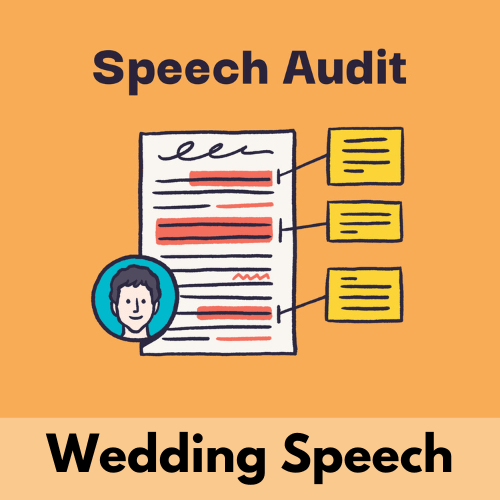Here are 5 things you should know about writing and delivering a wedding speech.
#1 - BE HONEST
Honesty is always the best policy.
If public speaking terrifies you, but this is the only person on the planet you’d even attempt to conquer that fear for, open with that and own it. Your honesty lets the other guests see every shake and voice crack as testament to magnitude of your affection for the person you’re speaking about – a person, by the way, they also adore. They want you to succeed and you’ll feel that energy coming back at you.
I had a best man with crippling anxiety, but he was determined to get up there and honor his best friend. I had him open with honesty, and gave him a joke along the lines of, “So if I pass out, all I ask is that someone drags me back to the table before dessert.”
If you know you’re going to be a fountain of tears – I’m talking to you sisters and dads – mention it early in your speech. Then when the waterworks start, you can play the moment as “I told you so,” instead of feeling self-conscious. (By the way, if you don’t, at the very least, get a lump in your throat at some point in your speech, you may not be human.)
#2 - BE SPECIFIC
Whenever you can, don’t just tell us – show us and be specific. Don’t just tell us the groom loves the bride “so much,” give us indisputable evidence. I wrote a speech for a maid of honor who told me that the groom slept with an EpiPen under his pillow because he’s violently allergic to cats and the bride has three of them. That’s love!
I had a best man who told me that the groom was “the kind of guy who would do anything for you.” I asked for an example. He gave me half a dozen, among them, the time the groom literally gave himself a hernia helping the best man move into a third floor apartment.
#3 - MAKE SURE EVERYONE CAN HEAR YOU!
People want to hear your speech. If people can’t hear you clearly, they won’t react to what you say. No reaction means no laughter and you’ll be distracted wondering why all your jokes are falling flat, and eventually, why you’ve lost the attention of the room.
So make sure people can hear you. I have a very sophisticated way to determine if people can hear you. When you get to the mic, loudly ask, “Can everybody hear me?” If they can’t, they’ll tell you, and you can adjust accordingly.
#4 - MAKE SURE EVERYONE CAN FOLLOW EVERYTHING YOU’RE SAYING
I always ask clients what annoys them about wedding speeches they’ve seen. The most frequent answer is when a speech is all ‘in jokes.’
Make sure every guest can follow every joke and every story. Imagine listening to your speech if you were someone’s plus one or aunt. It’s usually only a matter of a few words of explanation. I had a maid of honor tell me she met the bride ‘in Complicit,’ which I assumed was a typo. When I clarified, she explained they met freshman year in a comparative literature class with the world’s least enlightened reading list. Instead of calling it Comp Lit, they nicknamed it Complicit. It’s clear, it’s specific, it’s funny and it’s great insight into who those two were in college.
#5 - IT’S OK TO READ YOUR SPEECH
I'm not a huge fan of memorization, especially if it's not something you're super comfortable with or you do in your everyday life. A wedding speech isn’t a TED talk or a Broadway show. The audience doesn't have any expectation of memorization. You don't lose a single point going up there speech in hand.
Plus, punchlines depend on solid set-ups, so while paraphrasing is fine for business speeches, it's not great for comedy.
#5a - EVEN IF PLAN TO READ YOUR SPEECH, YOU STILL HAVE TO PRACTICE IT!
Practice is the true secret of speech success. Read it out loud as many times as you can. Do it over and over again. You can do it alone, just get the muscle memory of saying those words, and while you're doing it, you can make small tweaks anywhere you need to. Sometimes something that's great on the page is awkward to say out loud.
Maybe you want a period somewhere instead of a comma to break a sentence in two. Maybe you make something less formal or realize you keep saying something different than what's written -- just change it to whatever your brain is telling you to say.
See if you can get yourself to 'pretty darn near memorized.' You want to be able to have the written speech as a safety net, but for the most part, be able to look at whoever you're talking to -- or about. Don't read it like a 9th grader giving a book report. Make eye contact with people. Take your time. (It sounds obvious, but you'd be surprised.)






